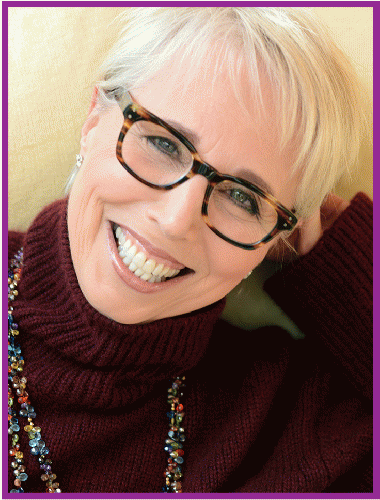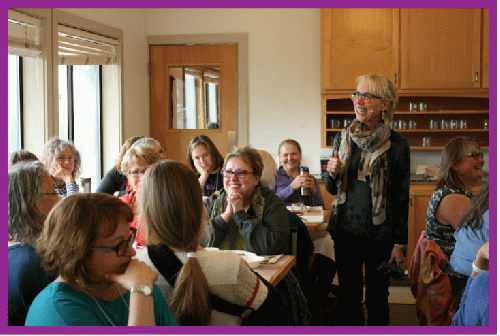Interview with Writer and Teacher, Geneen Roth
My guest today is Geneen Roth, author of ten books, including three New York Times bestsellers: When Food is Love, Lost and Found, and Women Food and God. Her newest book is This Messy Magnificent Life.
Joan Brunwasser: Welcome to OpEdNews, Geneen. You were one of the first to see the connection between our emotions and our relationship to food. How did that come about? How were you able to put your finger on something that had eluded our attention for so long?
Geneen Roth: I'd spent years in a hell realm with food and my body, gaining and losing over a thousand pounds. No matter how thin I got during the dieting part of the diet-binge cycle, it didn't affect the self-loathing about my body and my life. At some point, I realized it was the self-loathing that was at the core of my eating, and that my relationship with food was the outpicturing of that; it wasn't, I saw, that food or even the size of my body was the problem, it was the feeling that I was defective, a failure, lacking in value--and that I needed to keep proving I was allowed to be here, on earth, by always being in the process of losing weight. When I suffered about my weight, I felt that I was at least trying to be better than I was. And after many years of this same pattern, I caught on to the deeper layers of it, which was, as you say, the connection between our emotions and our relationship to food.
JB: For years, social norms, buttressed by the $50 billion dollar weight loss industry, have pushed a feminine ideal that is not practical, healthy or permanently attainable. Despite all that, women slavishly subscribe to the philosophy that you can never really be too thin. Then, when we don't reach our goal, we are filled with that deep sense of failure that you speak of, because of our lack of willpower. What a Catch-22. Many of us have also learned over the years not to trust our own judgment about food consumption - not just what to eat but even when or whether we're hungry. And that virtual surrender and always feeling bad about ourselves are really tough to overcome. Yet you somehow found the wherewithal to jump off that hamster wheel by taking courageous and radical action. Tell us about that, please.
GR: I wish I could say that it was wisdom, not woe that catalyzed the proverbial jump off that wheel, but it was that I had reached bottom and was contemplating suicide after years of self-and-body-hatred. I didn't want to keep living with wanting to rip myself apart, cut chunks of fat off my thighs, face and arms. It was unbearable. And so I gave myself two choices: stop dieting, eat what my body wanted or end my life. It seems reductionistic now to say that out loud, but that's exactly how it felt. And I told myself, if I stopped dieting and gained a huge amount of weight (which was my big fear, as I had only been on either a diet or a binge for almost two decades), I would see how it went for a few weeks. That, as it seemed as if I was already willing to take my own life, there was nothing to lose.
Almost immediately, I felt as if I'd been let out of prison. I was gleeful verging on ecstatic at not restricting myself, not judging myself, not shaming myself. I realized then that what I most wanted from being thin or losing weight was exactly what I was feeling then, without losing a pound: a sense of joy just because. A feeling of belonging here, in what I call earth school. Of being allowed goodness without having to pay for it by suffering and depriving myself.
JB: At some point after you figured this out and freed yourself from the diet trap, you started a support group in a friend's living room. What were you envisioning?
GR: Actually, I started my first group in my organic chemistry teacher's house, as I didn't have a job or money, and he and his wife hired me as a nanny for their two year old daughter. They were incredibly kind to offer me their living room when I told them about my idea for gathering with other women who were compulsive eaters and ready to stop shaming themselves.
I charged a dollar a night to cover the cost of the copies I'd made, and within the first hour or two, I realized that we were navigating new and thrilling territory--the link between what we were eating and what we were feeling. The ways we used food to express what we didn't feel capable of expressing directly. The fact that the problem really wasn't food, but our thoughts, feelings and beliefs about strength, power, sadness, rage, having women's bodies. Later on, I would say that "the world is on our plates" and that we eat the way we live because, as the Zen masters say, how we do anything is how we do everything. But in those early days, it was one step at a time. First, to begin unwinding what I considered the biggest source of pain in my own life, and then, to begin listening to other women's stories. I wrote a set of guidelines for sane and body-centered eating, and I also began creating exercises and questions that would touch the heart of the emotional reasons why people turned to food when they weren't hungry. More and more people heard about the group, wanted to join, and so I started another group, and then another. Until I'd saved enough money to rent my own apartment and hold the meetings there, we met in the back of a delicatessen that one of the women owned.
If I envisioned anything, it was writing a book about what we were discovering. Before that night at my chemistry teacher's house, before it occurred to me to unwind the relationship between food and self-loathing, I had fallen in love again with writing. I say "again" because I'd wanted to be a writer since fifth grade, but was convinced that I wasn't good enough, that it was impossible. But on a whim, I joined a weekly writing group led by the now well-known poet Ellen Bass called "Writing About Our Lives", and I remembered that writing had been my passion for years. After the first few weeks of the group, I realized I wanted to write more than I'd wanted to do anything, ever. So I decided to model my life exactly on Ellen's life: she led weekly groups so I would do that as well. She wrote poetry and I started doing that as well. She put together an anthology of women poets, and I decided I would create an anthology of women who were struggling with food and body size. My first book, Feeding the Hungry Heart, is the result. I suppose it's possible to say, although I've never said or even thought about it in this way, that the writing came first and I started the groups so that I would have something to write about.
JB: Thank you, Ellen Bass and fifth grade dreams! Your work has clearly struck a chord with many thousands of women over the years. You cited the Zen view that how we do anything is how we do everything. And you have ventured beyond food to write about the way our feelings also affect how we deal with money. Although it makes sense now, that connection came as a big surprise to me - attesting to the power of blind spots. Can you talk about money a bit?
GR: Here is one thing I've been learning over and over: that it's not the thing we think we want that we want -- whether it's a thin body, success at work, a loving relationship or riches -- it's how we believe that having that will affect us. The Big Lie is that things we can touch, see or have make us happy, but that never happens, not once. And as Daniel Gilbert, the Harvard professor, who wrote Stumbling on Happiness describes it: we do an awful lot of "miswanting", as we are terrible predictors about what will make us happy. About money, he says that after the basic needs for food, shelter and clothing are met, having more doesn't add more happiness to our lives. Somehow, though,we keep ourselves entranced about this so that we can keep wanting and keep believing that someday, out there in the future, we will finally relax, be content.
My own experience with money, as with food, was radical: we lost all our life savings in 2008. (I often think that if I wasn't so hard-headed, I might not have to have such catastrophic experiences. But apparently, wanting to kill myself after gaining and losing a thousand pounds and losing all my money was what it took to get my attention.) And after the initial shock, terror, shame and grief, and after receiving so much support from my friends and teachers, I realized that the only way I was going to make it through was by focusing on what I did have, not what I didn't. What I had enough of, not what I had just lost. I became vigilant about this practice, moment to moment, and was stunned by what I already had that I hadn't been noticing: chair, teacup, chocolate, sky, foot, love. Within a week, I felt as if I was drunk on abundance itself. And I understood that enough wasn't a quantity; it was a relationship to what I already had.
(Note: You can view every article as one long page if you sign up as an Advocate Member, or higher).







